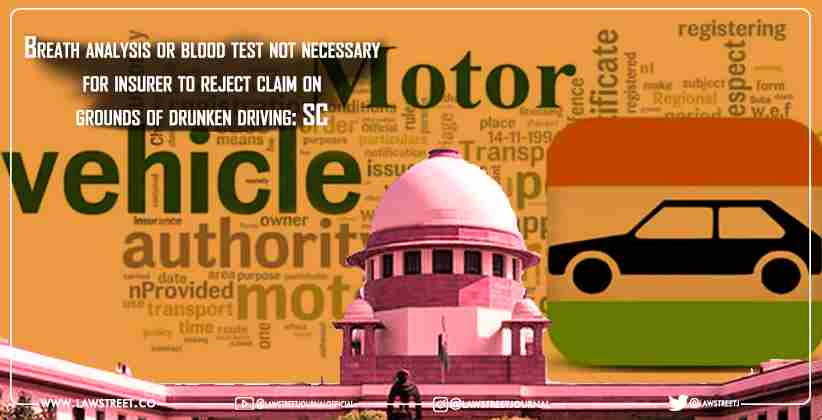In an important judgement, the Apex Court held that a breath analyzer test or blood test as contemplated under the Motor Vehicles Act, 1988 is not necessary for the insurer to reject an accident policy claim underground of drunken driving.
The Apex Court held that if the insurance company is able to establish from the fact that the driver was under the influence of alcohol at the time of the accident it will not be deprived of its right to exclude the policy benefits merely on the ground that the scientific test for alcohol present was not carried out.
The insurer can invoke the exclusion clauses in the policy contract if the attendant circumstances show that the accident was caused while driving under the influence of alcohol, even if the exact alcohol contained present in the body was not established.
Facts of the Case:
The court propositioned an appeal to be filed by the insurance company against an order of the National Consumer Disputes Redressal Commission which held the insurer at fault for excluding the policy liability on the ground of drunken driving.
As reported by the NCDRC the insurer had to prove that the alcohol content was above 30 mg out of 100 ml of blood, as stipulated under section 185 of the Motor Vehicles Act. The NCDRC held that without proving the said alcohol content present through the scientific results of breath analyzer and blood tests as prescribed under section 203 and 204 of the Motor Vehicle Act the insurer cannot exclude the liability.
Having said that the NCDRC altered the order of the State Consumer Disputes Redressal Commission which had rejected the complaint of the insured against the repudiation of the policy.
Apex courts decision
The Apex Court observed that the case records showed that the smell of alcohol was emanating from the driver. The report of the driver stipulated the smell of alcohol. The court agreed that the driver had consumed alcohol but held that the alcohol content was not proved to be beyond the legally permissible limit.
It was noted by the apex court that the prerequisite of section 185 is in the context of a criminal offence.
Also, if the prosecution has not filed a case under section 185 that does not indicate that a competent forum under the Consumer Protection Act is disabled from finding that the vehicle was being driven by the person under the influence of alcohol.
The court pointed out that it is not difficult to contemplate that the accident may take place with the driver being under the influence of alcohol and neither the breath test nor the laboratory test is done. A driver after the accident run away and a test may never be performed. But there may be evidence available which may indicate that the vehicle in question was being driven at the time of accident by a person under the influence of alcohol. It cannot be said that merely because there is no test performed the insurer would be deprived of its right to establish a case which is well within its rights under the contract.
Fact of the case indicating drunken driving
The court observed that the medical practitioner had discerned the smell of alcohol in the body of the driver. The accident happened the wee hours and there was no explanation from the parties regarding the cause of the accident. The driver and the co- passenger were in their late 20s and both of them had consumed alcohol.
The car was a Porsche, has a very powerful engine and can achieve an enormous speed, is reported to have gone out of control and hit the footpath of the road near India gate at New Delhi with such a massive force that the car overturned and caught fire. For which the fire services had come douse the fire. The car was rendered a total wreck.
It was noted that there was very less traffic at the time of the accident and the road was very wide, so something out of ordinary must have happened to cause the accident.
The bench also observed that the driver had pleaded guilty in the prosecution for rash and negligent driving under section 279 of the Indian Penal Code.
The Coram decided that the view of the State Commission, that the accident was caused due to drunken driving by applying the principles of res ipsa liquitor, was probably true. Therefore, the national commission was in error in reversing it in a summary proceeding.








